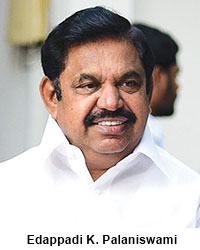 – Shivani Chaturvedi (Chennai)
– Shivani Chaturvedi (Chennai)
A new bill providing a 7.5 percent quota within the existing reservation totaling 69 percent of all seats in Tamil Nadu’s 50 medical colleges was passed by the state’s legislative assembly on September 15 for students graduating from state government schools who have also passed NEET (National Eligibility-cum-Entrance Test). In 2013, the Central government mandated NEET as the sole examination for admission into all medical colleges nationwide. Top scorers in descending order in NEET get the choice of their medical colleges subject to 85 percent of seats in medical colleges being allotted to students domiciled in every state.
However, the prime motivation of the new Bill is that too few school-leavers from government schools affiliated with the Tamil Nadu Board of Secondary Education (TNBSE) are scoring sufficiently high marks in NEET to be admitted into the state’s 50 medical colleges under the 85 percent domicile quota. Most seats are being bagged by private school-leavers.
The new quota Bill is the outcome of the recommendation of a committee headed by P. Kalaiyarasan, former judge of the Madras high court. The committee proposed reservation between 7.5-10 percent for class XII students graduating from schools affiliated with TNBSE.
This Bill has been unanimously passed by the state’s legislative assembly following loud protests that state government school students are under-represented in Tamil Nadu’s 50 medical colleges including 14 private medical colleges, because the TNBSE curriculum didn’t prepare them sufficiently to be highly ranked in NEET. The mismatch between the TNBSE curriculum and NEET was dramatically highlighted in 2017 when a girl student who topped the annual TNBSE school-leaving exam committed suicide for failing to qualify under NEET. On March 21, chief minister Edappadi K. Palaniswami announced reservation of sub-quota in medical admission for state government school students who clear NEET, but score below the prescribed cut-off marks.
Under the Bill, the 7.5 percent TNBSE affiliated school students with highest NEET rank/score are eligible for admission into undergraduate programmes in allopathy, medicine, dentistry, Indian medicine and homeopathy colleges within the state under the new special quota. Under NEET’s domicile rule, 85 percent seats in medical colleges in every state are reserved for students resident within all 29 states and seven Union territories, with 15 percent to be allotted (to those who clear NEET) at the discretion of the institutional management.
“This is an overdue initiative of the AIADMK government. The total number of seats in Tamil Nadu’s government medical colleges are 3,300 per year, of which 2,785 are for domiciled students. In addition, government-aided and private medical colleges have 2,347 seats. Therefore, under the new quota Bill, 200 seats will be available for state government school-leavers. However, private school students who may have higher NEET scores will have to stand down. But if this ‘horizontal reservation’ of 7.5 percent is augmented with an increase in the number of colleges, private school-leavers wouldn’t be excluded,” explains R. Karthikeyan, a second year MBBS student at Chennai’s Tagore Medical College.
ollege. Chennai-based educationist Dr. S. Somasundaram, an alumnus of Madurai Kamaraj, Bhoj and Periyar universities, also welcomes the state government’s new quota order. “Students in government schools tend to be from EWS (economically weaker section) households. They are at a disadvantage when writing NEET and other public/national university entrance exams as they are not able to pay for coaching like most class XI and XII students of private schools. Therefore, I welcome the government’s reservation mandate,” says Dr. Somasundaram.
Yet it’s pertinent to note that a special quota has had to be legislated for state government students to facilitate their entry into medical colleges because of poor learning outcomes in TNBSE affiliated institutions. In turn this is the outcome of continuous interference with the curriculums, teachers recruitment and politicisation of government schools, of which all political parties are guilty.
Moreover for the public it is — or should be — a chilling consideration that over 69 percent of students in Tamil Nadu’s merely 50 medical colleges are admitted on considerations other than merit. While the interests of equity and social justice are being served by the runaway affirmative action on which there is evidently allparty consensus, public health and safety is compromised.
Posted in Education News




















